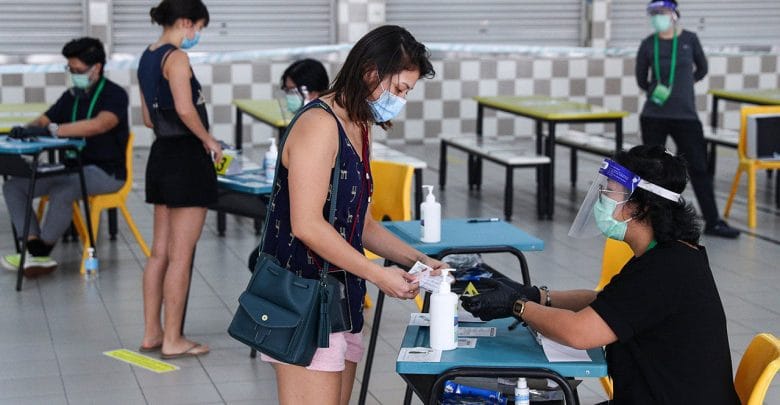
Singapore’s ruling party wins easily—but its vote falls sharply
Rarely, in over half a century in power, has the PAP fared worse
BY LOCAL STANDARDS it was a stunning rebuke. The People’s Action Party (PAP), which has governed Singapore since before independence in 1965, lost ten of the 93 parliamentary seats up for grabs in a general election on July 10th. The main opposition outfit, the Workers’ Party (WP), scooped all the dissenting districts. In the process it won two Group Representation Constituencies (GRCs)—multi-member constituencies in which voters choose a party’s team of candidates and not an individual—as well as a single-member seat. The PAP’s share of the popular vote slid from almost 70% in the last election of 2015 to 61.2%, one of its worst showings ever. More than 95% of eligible Singaporeans went to the polls, as the law requires them to do.
The opposition’s gains came in spite of myriad challenges. Neither Singapore’s elections department, nor its body for determining constituency boundaries, is independent of the government. The prime minister, Lee Hsien Loong, decided when to call the contest. The campaign lasted just nine days. Detailed regulations governed how precisely campaigning should occur. And in a further twist this year, opposition groups had to contend with covid-19’s effects on their ground game. Social-distancing regulations meant that rallies, a critical tool for stirring renegade hearts in the past, were banned. History suggested that the PAP might win big: in an election just months after the 9/11 attacks in America the party won 75% of the popular vote.
The loss of the GRC of Sengkang—only the second ever to fall to the opposition—was a particular surprise. A zappy four-person crew from the WP bested their grizzled PAP rivals by 52.1% to 47.9%. The presence on the WP ticket of Jamus Lim, a Harvard-educated economist, probably helped after his strong showing in a recent televised debate. And a furore over another WP candidate, Raeesah Khan, gained the team publicity. The weekend before the election, Ms Khan found herself under police investigation for allegedly using Facebook posts to promote “enmity between different groups on grounds of religion or race”, which is illegal under Singapore’s penal code. (One post supposedly stated that Singapore’s authorities treat rich Chinese people and white people differently from others, while another, commenting on a news article about the release from prison of corrupt church leaders, allegedly claimed that minority groups and Muslim leaders receive harsher treatment by comparison.) Ms Khan apologised, but deftly sparked debate about the government’s treatment of minorities.
The greatest embarrassment of the night befell Heng Swee Keat, Mr Lee’s anointed successor. Mr Heng’s four-person team won its GRC, but with just 53.4% of the vote. Because he is the leader of the generation of PAP officials poised to take charge, who have been managing the response to covid-19, this result suggests broader disquiet about the future. Voters did not appear grateful for stimulus packages worth almost 20% of GDP that Mr Heng, as finance minister, shepherded through Parliament in the wake of the pandemic. Perhaps they were not enough to distract from official forecasts that the economy will shrink by between 4% and 7% this year.
The contest is supposed to be Mr Lee’s last. He has said he will step down before his 70th birthday, in early 2022. But the election result, despite a strong showing in his own constituency, is hardly the gilding of his legacy that he might have wanted. “I am determined to hand over Singapore intact and in good working order to the next team,” he declared on the campaign trail. Voters seem to think that the machinery of state requires a little more of a tune-up than Mr Lee has carried out.
